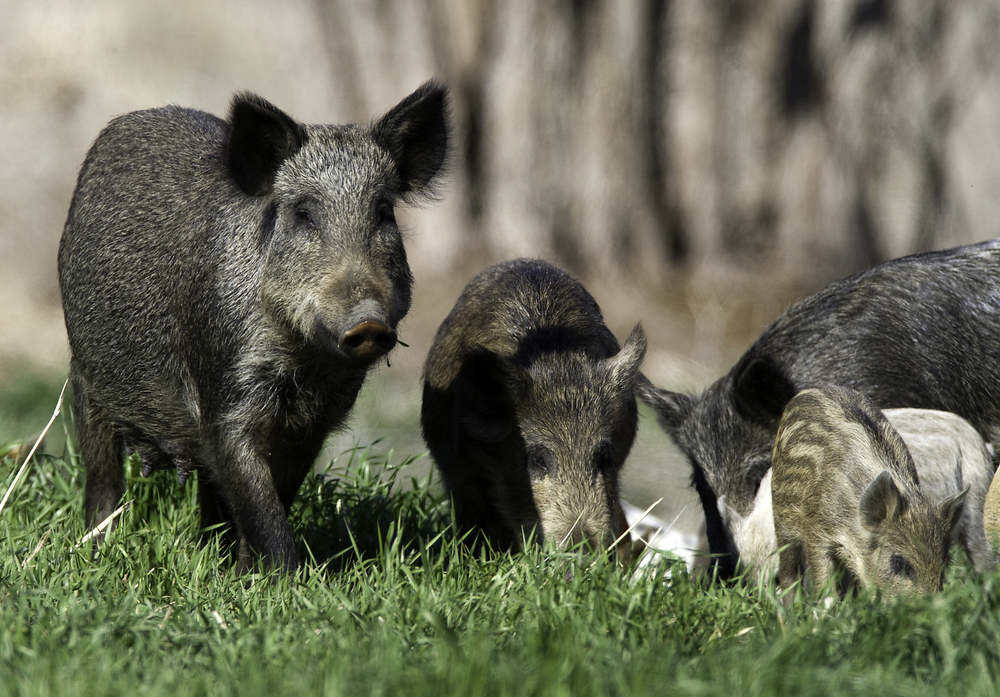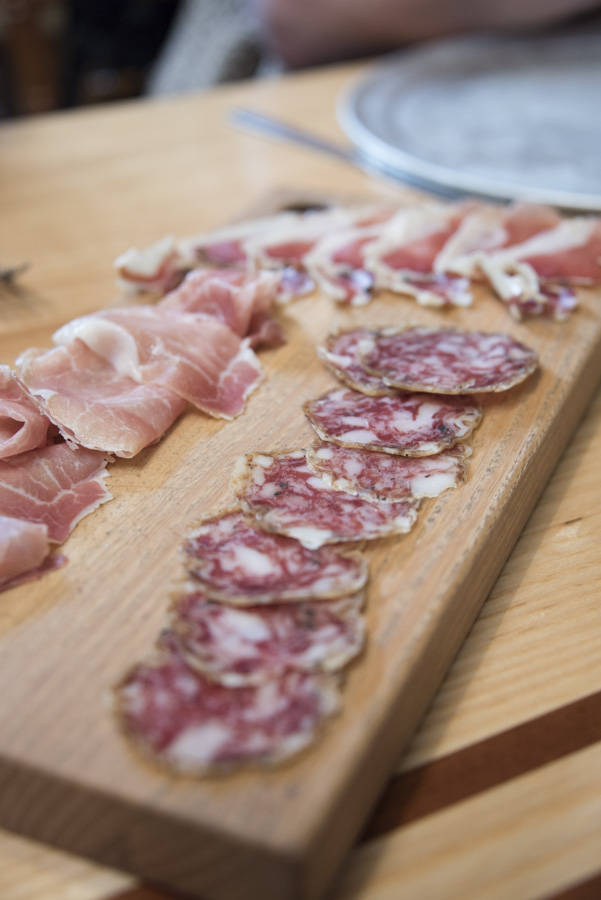New Years Resolution: Eat More Wild Pig
Save the environment and help farmers by eating some feral hog.
New Years Resolution: Eat More Wild Pig
Save the environment and help farmers by eating some feral hog.

by Laurie L. Snidow on Shutterstock
Feral pigs are increasingly a huge problem for farmers and ranchers. They destroy crops, tear up fences and are generally a nuisance.
Today’s feral hogs are descendents of pigs that escaped after they were brought to North America in the 16th century by early European settlers. These pigs now number in the millions as they breed at a fast rate, with big litters and a shorter gestation period than other animals. The USDA estimates there are at least six million wild pigs roaming the country, and around half of them are in Texas.
The problem has gotten so out of hand that the USDA has started a $75-million pilot project dedicated to controlling the wild hog population that has distributed grants to 10 states.
So why not eat them?
That’s the solution Texas chef Taylor Hall has proposed. Hall grew up on a ranch in northern Texas, where his family raised around 2,000 cattle a year. He experienced firsthand the headaches caused by the wild pig invasion. Ranchers in Texas have constantly had to trap wild hogs to keep them off of their property. They typically sell them to holding facilities for a bit of extra money.
So when Hall started his restaurant, Apis, near Austin a few years ago, he contacted the ranch manager who runs his family’s ranch to see if he could provide them with some wild pigs. “If you’re trapping them anyway, you might as well use them for food,” says Hall.

A few times a year, the restaurant will receive three or four wild pigs that ranchers have trapped on his family’s ranch. These pigs roam free and live off of an organic, foraged diet until they get caught. Because of the arrangement he has, Hall only has to pay a $35 fee per pig at the slaughterhouse that inspects the meat. So the ranch benefits by getting rid of the hogs, knowing they won’t go to waste, and Hall receives some cheap, tasty meat in return.
Hall now serves a salumi made with wild pig at his pizzeria, and he often offers a ragu wheat pasta dish using the hog meat at Apis. When cooking with wild hog, he says, he mixes in some domestic pig fat, as feral meat is typically much leaner. Wild pig is gamier than domestic pork, and it has a more intense flavor, but chefs say it can be delicious if cooked the right way. “It can be absolutely fabulous,” says Hall.

In addition to being a nuisance to farmers, wild hogs are threatening ecosystems across North America as they eat everything. Researchers have called them “ecological train wrecks.” While most of the US’s feral pig population is concentrated in Texas and southern states, some states further north, such as Montana, fear pigs may spread across the border from Canada. The wild pig population in Canada has exploded in recent decades, after being imported in the 1980s and 1990s as livestock.
So, if you get the chance, trap them, butcher them and put them on a plate (or just ask someone like Hall to do all of that for you).
Follow us
This work is licensed under a Creative Commons Attribution-NoDerivatives 4.0 International License.
Want to republish a Modern Farmer story?
We are happy for Modern Farmer stories to be shared, and encourage you to republish our articles for your audience. When doing so, we ask that you follow these guidelines:
Please credit us and our writers
For the author byline, please use “Author Name, Modern Farmer.” At the top of our stories, if on the web, please include this text and link: “This story was originally published by Modern Farmer.”
Please make sure to include a link back to either our home page or the article URL.
At the bottom of the story, please include the following text:
“Modern Farmer is a nonprofit initiative dedicated to raising awareness and catalyzing action at the intersection of food, agriculture, and society. Read more at <link>Modern Farmer</link>.”
Use our widget
We’d like to be able to track our stories, so we ask that if you republish our content, you do so using our widget (located on the left hand side of the article). The HTML code has a built-in tracker that tells us the data and domain where the story was published, as well as view counts.
Check the image requirements
It’s your responsibility to confirm you're licensed to republish images in our articles. Some images, such as those from commercial providers, don't allow their images to be republished without permission or payment. Copyright terms are generally listed in the image caption and attribution. You are welcome to omit our images or substitute with your own. Charts and interactive graphics follow the same rules.
Don’t change too much. Or, ask us first.
Articles must be republished in their entirety. It’s okay to change references to time (“today” to “yesterday”) or location (“Iowa City, IA” to “here”). But please keep everything else the same.
If you feel strongly that a more material edit needs to be made, get in touch with us at [email protected]. We’re happy to discuss it with the original author, but we must have prior approval for changes before publication.
Special cases
Extracts. You may run the first few lines or paragraphs of the article and then say: “Read the full article at Modern Farmer” with a link back to the original article.
Quotes. You may quote authors provided you include a link back to the article URL.
Translations. These require writer approval. To inquire about translation of a Modern Farmer article, contact us at [email protected]
Signed consent / copyright release forms. These are not required, provided you are following these guidelines.
Print. Articles can be republished in print under these same rules, with the exception that you do not need to include the links.
Tag us
When sharing the story on social media, please tag us using the following: - Twitter (@ModFarm) - Facebook (@ModernFarmerMedia) - Instagram (@modfarm)
Use our content respectfully
Modern Farmer is a nonprofit and as such we share our content for free and in good faith in order to reach new audiences. Respectfully,
No selling ads against our stories. It’s okay to put our stories on pages with ads.
Don’t republish our material wholesale, or automatically; you need to select stories to be republished individually.
You have no rights to sell, license, syndicate, or otherwise represent yourself as the authorized owner of our material to any third parties. This means that you cannot actively publish or submit our work for syndication to third party platforms or apps like Apple News or Google News. We understand that publishers cannot fully control when certain third parties automatically summarize or crawl content from publishers’ own sites.
Keep in touch
We want to hear from you if you love Modern Farmer content, have a collaboration idea, or anything else to share. As a nonprofit outlet, we work in service of our community and are always open to comments, feedback, and ideas. Contact us at [email protected].by Alex Robinson, Modern Farmer
December 30, 2019
Modern Farmer Weekly
Solutions Hub
Innovations, ideas and inspiration. Actionable solutions for a resilient food system.
ExploreExplore other topics
Share With Us
We want to hear from Modern Farmer readers who have thoughtful commentary, actionable solutions, or helpful ideas to share.
SubmitNecessary cookies are absolutely essential for the website to function properly. This category only includes cookies that ensures basic functionalities and security features of the website. These cookies do not store any personal information.
Any cookies that may not be particularly necessary for the website to function and are used specifically to collect user personal data via analytics, ads, other embedded contents are termed as non-necessary cookies.
Maybe more hunters would participate if states would make hunting this animal easier…..and landowners would stop charging $250/hog to harvest them. I’ve lost all sympathy for landowners. I used to take 6-9 hogs/year. But the last 2 years I’ve not even hunted them. Simply stop treating the hunting of feral hogs as if they were a big game animal!
What about trichinosis?
I gave it a shot last year, purchasing a commercially prepared wild boar roast. I prepared it much like I would any game roast, bit it was pretty bad. Perhaps salami would be best or avoid males. Would love to see a good recipe for roasted meat.
How do we get some!?
Wild pig must make excellent bacon, there is too much fat on the supermarket stuff. Plus you don’t know what conditions the pigs were raised in or what they ate or what medicine or chemicals they were administered or even how they were killed. If you shoot a wild pig even the slaughter is very humane, compared to the horror of a slaugterhouse!